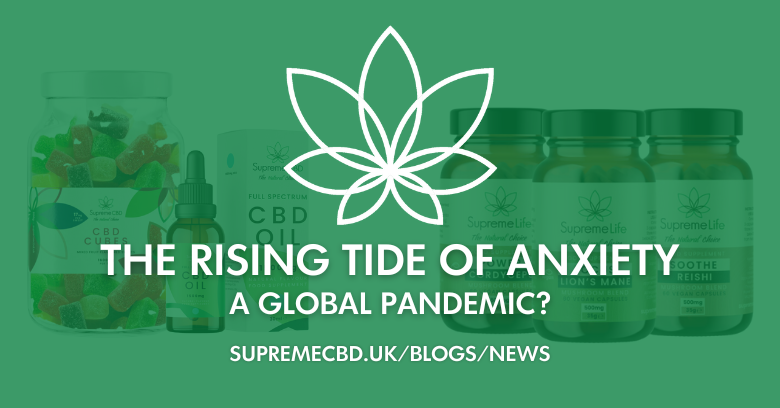
What is Anxiety & Why is it Becoming More Common?
What is Anxiety?
Anxiety is a natural human response when we feel under threat. It’s often described as a feeling of fear, dread, or unease, which can range from mild to severe.
Anxiety can show up in how we feel physically, mentally, and in how we behave. It’s particularly common to experience anxiety while coping with stressful events, unexpected occurrences, or changes outside of your control - especially if they could have a big impact on your life.
However, anxiety can become a problem if it starts to interfere with our daily life or relationships. If you’re feeling anxious, remember that it’s a common experience and there are resources available to help.
The Rising Tide of Anxiety is a Global Issue - You’re Not Alone
It’s important to remember that if you’re dealing with anxiety, you are not alone. Anxiety is a common experience that many people around the world face. In fact, an estimated 4% of the global population currently experience an anxiety disorder.
That’s over 301 million people worldwide.
In the UK alone, 60% of adults reported experiencing anxiety that interfered with their daily lives in the past two weeks.
These numbers highlight the fact that anxiety is a shared human experience, touching lives across all ages, genders, and backgrounds.
It’s okay to feel anxious, and it’s okay to seek help. Remember, everyone’s experience with anxiety is unique, and what works for one person might not work for another. But one thing is certain: you are not alone in this journey.
There are resources available and people who understand what you’re going through. Reach out, speak up, and remember, it’s okay not to be okay sometimes. You are not alone.
Anxiety is Becoming More Common - But Why?
Anxiety, a common mental health disorder, has seen a significant increase in prevalence over the past decade. This rise is attributed to various factors, including the COVID-19 pandemic, economic uncertainty, and societal changes.
The COVID-19 pandemic has undeniably played a significant role in the surge of anxiety. The World Health Organization reported a 25.6% increase in anxiety disorders in 2020 as lockdowns were implemented and people grappled with an unknown virus. However, the rise in anxiety levels was not solely due to the pandemic. Anxiety levels were already increasing in some countries before the pandemic began.
Economic and political factors have also contributed to the rise in anxiety. As the middle class erodes, there is growing economic uncertainty for much of the population. The high cost of health care also creates a burden of chronic worry about getting sick. Uncertainty doesn’t cause anxiety, but it provides breeding grounds for it.
Societal changes, such as the advent of social media and poor sleep habits, have also been linked to the increase in anxiety. Social media, in particular, has been criticised for promoting unrealistic expectations and comparisons, leading to increased stress and anxiety.
Interestingly, the prevalence of anxiety disorders has been found to be significantly higher in women than in men. This disparity could be due to women taking on more household responsibilities during the pandemic and the gender pay gap increasing during this difficult time.
How to Deal with Anxiety
Coping with anxiety is a crucial aspect of managing mental health. Here are some strategies that have been found to be effective:
- Exercise: Regular physical activity can help reduce anxiety by boosting your mood and acting as a natural stress reliever.
- Healthy Diet: Eating a balanced diet can help keep your energy levels stable and minimise mood swings.
- Deep Breathing Techniques: These can help to calm your mind and body, reducing anxiety.
- Mindfulness and Meditation: These techniques can help you stay grounded in the present moment, reducing anxiety
- Progressive Muscle Relaxation: This involves tensing and then releasing different muscle groups in your body, which can help you relax and decrease anxiety
- Cognitive Behavioral Therapy (CBT): This form of therapy helps you identify and challenge thought patterns that lead to anxiety.
- Support Groups: Connecting with others who are experiencing the same struggles can provide comfort, reduce feelings of isolation, and provide practical tips.
Remember, it’s important to seek professional help if your anxiety is causing distress or interfering with your daily life.